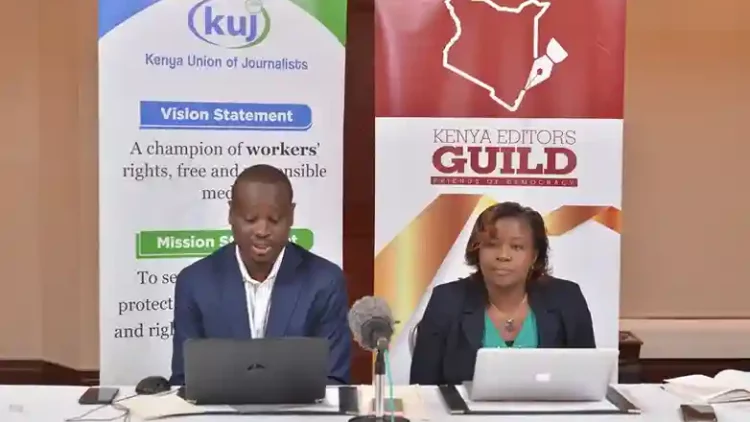State of Media Freedom in Kenya: KMSWG Declaration
On February 21, 2023, the Kenya Media Sector Working Group (KMSWG) issued a declaration at the Serena Hotel in Nairobi, Kenya.
The KMSWG is a coalition of media stakeholders and associations in Kenya. The declaration was issued after the KMSWG commissioned a survey to examine the state of media freedom in Kenya, with the aim of helping its members prepare interventions to protect journalists and the media sector against current and potential threats.
The declaration recognizes that media is a public good and a key pillar of democracy and the well-being of society. It acknowledges that media freedom in Kenya is facing many challenges, some of which are unique to the country.
The KMSWG reviewed and analyzed the media environment through various engagement forums, surveys, and reports by different media stakeholders and experts.
The declaration outlines several key issues facing the media industry in Kenya, including challenges with the media legal regime and regulation, threats from existing regulatory bodies, and attacks on journalists.
Below is the declaration:
State of Media Freedom in Kenya
A declaration was issued by the Kenya Media Sector Working Group (KMSWG) on February 21, 2023, at the Serena Hotel, Nairobi, Kenya.
We, members of the Kenya Media Sector Working Group (KMSWG), which is a coalition of media stakeholders and associations in Kenya:
Having commissioned a survey to look at the state of media freedom in Kenya to help its members in risk analysis of the industry with a view to preparing interventions to insulate journalists and the media sector against current and potential threats;
Recognizing that media is a public good and a key pillar of democracy and the well-being of the society;
Acknowledging that media freedom in Kenya is facing myriad challenges, some of which are unique to Kenya;
Having reviewed and analyzed the media environment through various engagement forums and through the survey and other reports by different media stakeholders and experts, on the risks and opportunities for the Kenyan media, hereby declare as follows:
Media Legal Regime and Regulation
We recognize that the Kenyan media industry is facing global but also specific challenges based on factors obtained within the local national environment.
According to the survey, there is a cocktail of laws that regulate the media, pushing journalists to self-censorship and submission to authorities.
There are about 22 different laws that are often used against the media and journalists whenever powerful forces, including State agents, want to silence the Fourth Estate.
We raise this as a red flag and call on the Government to move with speed and work with the media sector to harmonize the media regulatory regime in Kenya to promote professional, free and independent media.
This will promote professionalism and ethical conduct of media practice for the common good of society.
We also note with concern threats from the existing regulatory bodies which seek to undermine industry cohesion, consultation, inclusion and robust stakeholder engagement through overzealous and improper interpretation and application of existing laws. We as stakeholders commit to relentlessly push back on these forms of clawback on the hard-fought space for media freedom as enshrined in Article 34 of the Constitution of Kenya (2010).
We urge the Government and all its agencies to avoid any actions that may undermine the constitutionally guaranteed media freedom and promote the spirit of media self-regulation.
Government Advertising Agency
The Government Advertising Agency (GAA) has been identified as a big impediment to freedom of the media given the experience of its use as a tool to blackmail media enterprises, with the consequence that it has killed investigative journalism and led to self-censorship on the coverage of key public issues, including corruption, governance, the rule of law and constitutionalism. The GAA has been used to strangle media freedom, freedom of expression, and access to information as stipulated under Articles 33, 34, and 35 of the Constitution respectively.
Attacks on journalists
We note increased cases of attacks on journalists in the country, mainly by overzealous security officers and politicians who send goons to unleash terror on journalists and media workers.
There have also been increased attacks on journalists by officials of county governments. This is a threat to our democracy and the enjoyment of the civil liberties as provided for in the Constitution.
We commit to standing up firmly in defence of press freedom and the safety of journalists.
Gag orders and jailing of journalists
The industry has experienced a worrying trend of gag orders against the media which negatively impact media freedom in Kenya.
The media sector leadership has made efforts to engage the Judiciary to restrain themselves from issuing preemptive gagging orders meant to stop the media from airing or publishing stories of national interest.
The Kenyan media industry has continued to experience instances of journalists being harassed and jailed under circumstances relating to their legitimate work.
For instance, an editor from Tuko, an online media platform, was sentenced to five days in jail for allegedly failing to comply with Court orders.
Didacus Malowa, the editor, was imprisoned after allegedly declining to publish an apology for an article that was considered misleading about the proceedings of the National Youth Service (NYS) corruption case.
Our position remains that this was a matter that fell within the jurisdiction of the Media Complaints Commission in the spirit of promoting free and independent media through self-regulation as contemplated in the Constitution.
Massive Layoffs in the media sector
The industry has witnessed massive layoffs of experienced and skilled journalists which has left newsrooms bleeding with a reduced workforce.
This has not only affected newsrooms but poses a great danger to the growth and sustainability of the media industry.
Prospective journalists are increasingly getting discouraged from pursuing journalism as a profession and those already in the industry feel a sense of dejection and discouragement.
The layoffs pose a huge risk to the stability of the media sector and its important role as a public watchdog.
We call on investors in the media industry, other media players, the government, and international partners to work together on strategies toward realizing media viability and sustainability to mitigate against various emerging challenges including the shocks and disruptions of technology.
Journalism as a public good must be supported to be the strongest pillar of democracy.
As Kenya Media Stakeholders we are concerned by the action that has been taken by the Attorney General of the Republic of Kenya to give an advisory that is likely to take Kenya back to the dark days when the state regulated the media with iron fists.
We leaders and members of Kenya Media Sector Working Group, therefore, demand that:
- Calls on the International Community to support the media in navigating the challenges that threatened press freedom in Kenya before it is too late
- The state should develop a public advertising law with media industry participation to regulate the operations of the GAA and guarantee a fair and definite allocation of resources towards advertising in the community and other emerging media houses in the regions/counties to promote plurality and diversity; This should include restraint on its use to gag the media.
- Repeal the following sections in the penal Code 40 (1); 66; 66A; 67; 96; 194-200; touching on different issues but unduly limiting freedom of the media.
- Review the Kenya Broadcasting Corporation Act to make KBC a public service media
- Establish a media diversity and sustainability fund with input /consultation with the media industry;
- Repeal provisions of the Kenya Information and Communication (Amendment) Act that give the Communication Authority regulatory functions over Broadcast content, creating an unnecessary overlap.
- Amend the Films and Stage Plays Act to exclude media enterprises from the jurisdiction of the Kenya Films Classification Board.
- Repeal the Books and Newspapers Act
- Review relevant laws to ensure that the overall responsibility of running a news media enterprise shall lie with a qualified, publicly accountable, professional journalist.
- Amend the Computer Misuse and Cybercrimes Act in support of freedom of expression and self-regulation;
- The government and all regulatory bodies exercise a judicious and consultative approach to the regulation of the media industry and respect the role of stakeholders to promote the rule of law and the constitutional underpinnings of press freedom.
Signed by the following members of the Kenya Media Sector Working Group :
- Kenya Editors’ Guild
- Kenya Union of Journalists (KUJ)
- Article 19
- Kenya Correspondents Association (KCA)
- Association of Media Women in Kenya (AMWIK)
- Defenders Coalition-Kenya.
- Political Journalists Association Of Kenya
- Kenya Parliamentary Journalists Association (KPJA)
- Kenya Environment and Science Journalists Association (KENSJA)
- Digital Broadcasters Association (DBA)
- Journalists for Human Rights (JHR)
- Association of Freelance Journalists (AFJ)
- Kenya Community Media Network (KCOMNET)
- Development Through Radio (DTM)
- Association of Devolution Journalists
- International Association of Women in Radio and Television
- Association of Professional Broadcasters

